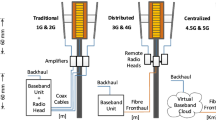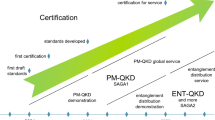Abstract
A differential space-time block code (DSTBC) provides full diversity advantage and does not require any radio channel estimation in the receiver, which makes it an attractive alternative to the well-known coherent space-time block code (STBC). However the original design of DSTBC allows only pure phase shift keying (M-PSK) modulation scheme, which are not optimal for M > 4. In this paper a simultaneous amplitude and phase modulation scheme for DSTBC with 2 transmit and several receive antennas is introduced. The performance of the proposed scheme is investigated and compared with DSTBC techniques using pure M-PSK modulation.
Similar content being viewed by others
References
V. Tarokh and H. Jafarkhani, “A Differential Detection Scheme for Transmit Diversity”, IEEE Journal on Selected Areas in Communications, Vol. 18, pp. 1169–1174, July 2000.
H. Jafarkhani and V. Tarokh, “Multiple Transmit Antenna Differential Detection from Generalized Orthogonal Designs”, IEEE Transactions on Information Theory, Vol. 47, pp. 2626–2631, September 2001.
H. Rohling and V. Engels, “Differential Amplitude Phase Shift Keying (DAPSK) – A New Modulation Method for DVBT”, in International Broadcasting Convention, pp. 102–108, 1995.
X.-G. Xia, “Differentially en/decoded Orthogonal Space-Time Block Codes with APSK Signals”, IEEE Communications Letters, Vol. 6, pp. 150–152, April 2002.
G. Bauch, “A Bandwidth-Efficient Scheme for Non-coherent Transmit Diversity”, in Proc. of IEEE Globecom Conference, San Francisco, CA, USA, December 1–5, 2003.
G. Bauch, “Differential Amplitude and Unitary Space-Time Modulation”, in Proc. of 5th International ITG Conference on Source and Channel Coding, Erlangen, January 14–16, 2004.
S. Alamouti, “A Simple Transmitter Diversity Technique for Wireless Communications”, IEEE Journal on Selected Areas of Communications, Vol. 16, No. 8, pp. 1451–1458, 1998.
C. Gao, A. Haimovich, and D. Lao, “Bit Error Probability for Space-Time Block Code with Coherent and Differential Detection”, IEEE Vehicle Technology Conference (VTC’02 Fall), Vancouver, Canada, September, 2002.
J. Proakis, Digital Communications, McGraw-Hill 4th edition, 2000, pp. 279–280.
Author information
Authors and Affiliations
Corresponding author
Additional information
Alexandre Vanaev received B.Eng. degree in Electrical and Electronic engineering from the St. Petersburg State Polytechnic University, Russia in 1998, and M.Sc. degree in “Information and communication systems” from Technical University Hamburg-Harburg in 2002. He is currently pursuing his Ph.D. in the Technical University Hamburg-Harburg, Department of Telecommunications. His research interests include prospective OFDM-based wireless communication systems and MIMO technology.
Prof. Hermann Rohling is with the Technical University Hamburg-Harburg, Germany where he has developed an international reputation for Mobile Communication (4G) and automotive radar systems. Previously Prof. Rohling was with the AEG Research Institute, Ulm as a researcher working in the area of digital signal processing for radar and communications applications. His research interests have includedWideband Mobile Communications especially based on Multicarrier Transmission Techniques (OFDM) for future broadband systems (4G), signal theory, digital radar signal processing, detection, estimation and differential GPS for high precision navigation. Prof. Rohling is a member of Informationstechnische Gesellschaft (ITG), German Institute of Navigation (DGON) and a Fellow of IEEE. He is a chairman of the September 2006 International OFDM Workshop (InOWo 2006) and the International Radar Symposium (IRS 2006) in Krakow, Poland. Prof. Rohling is theVice President of the Technical University Hamburg-Harburg.
Rights and permissions
About this article
Cite this article
Vanaev, A., Rohling, H. Design of Amplitude and Phase Modulated Signals for Differential Space-Time Block Codes. Wireless Pers Commun 39, 401–413 (2006). https://doi.org/10.1007/s11277-006-9046-5
Received:
Accepted:
Published:
Issue Date:
DOI: https://doi.org/10.1007/s11277-006-9046-5




